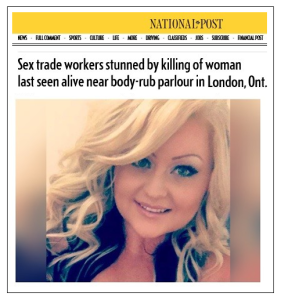Re: Sex trade workers stunned by killing, Oct. 31st 2017, The National Post.
 As an advocate for exploited girls and women, I was deeply saddened to read about the recent killing of London’s Josie Glenn; and more so, because reports suggest she was a victim of sex industry violence. Because exploited women are so often overlooked, I appreciate The National Post shining the spotlight on this tragedy. At the same time, I’m deeply concerned that the article gives voice to an organization whose efforts may, in fact, endanger women like Glenn.
As an advocate for exploited girls and women, I was deeply saddened to read about the recent killing of London’s Josie Glenn; and more so, because reports suggest she was a victim of sex industry violence. Because exploited women are so often overlooked, I appreciate The National Post shining the spotlight on this tragedy. At the same time, I’m deeply concerned that the article gives voice to an organization whose efforts may, in fact, endanger women like Glenn.
The London Free Press, which originally published the story, offered a soap box to one activist on a nihilistic rant, saying “Sex work isn’t what harmed Josie. It was . . . laws/by-laws that make it less safe…Efforts to speak for or de-legitimize sex work continuously puts workers in danger.” The Post, then, amplified the fable, by running the article hours later.
We did, in fact, have some old prostitution laws that arguably created danger in isolated circumstances. But in 2013, those were struck down by the Supreme Court in a challenge called Bedford vs Canada. The man behind the crusade, law professor Alan Young, admitted under oath that unrestricted prostitution doesn’t work, based on the evidence from countries that have tried it. His contention was that Canada’s response to prostitution had been sloppy. The court agreed, and within the year, we came out ahead with laws to reasonably address the harms suffered by this vulnerable segment of society. The cornerstone of the legislation makes it illegal to purchase sexual services. Along with that, is a measured leniency for the providers of sexual services, given that the sex industry is rife with exploitation.
The then, Justice Minister, Peter Mackay, called it a uniquely Canadian approach, but it closely harkens to the so-called Nordic Model that was first adopted by Sweden in 1999. The approach has been strongly credited with not only reducing prostitution, but the rates of sex industry violence and human trafficking, as well. In spite of that, the Canadian legislation wasn’t so popular across party lines. While the Trudeau Liberals have, so far, done little more than sniff at it, Ontario’s Premier lead an attack on it following its 2014 enactment. But she later backed off after her own Attorney General verified it’s alignment with our Charter of Rights and Freedoms.
The media hasn’t been helpful, either. Instead of representing the issue with any kind of objectivity, most outlets daftly promote the same pro-prostitution rhetoric that led to increased crime and violence in places like Germany and the Netherlands. The only ones who stand to benefit are pimps and johns.
If we’re going to be truly honest about why women and children are being harmed in the sex industry, it’s happening in spite of our upgraded laws. The harm happens because the perpetrators of the violence, the sex buyers, are rarely met with more than a nudge and a wink. Sadly, our society has remained unconcerned for the health and safety of girls and women on the margins. If that were not the case, enforcement would have already crippled the industry, and Josie Glenn would likely be alive today.


Recognizing that a child involved in a commercial sex act is a victim of sexual exploitation, entitled to support, reparations, and remedies, in line with international human rights law, and that states must take all appropriate measures to prevent sexual exploitation and abuse of children.